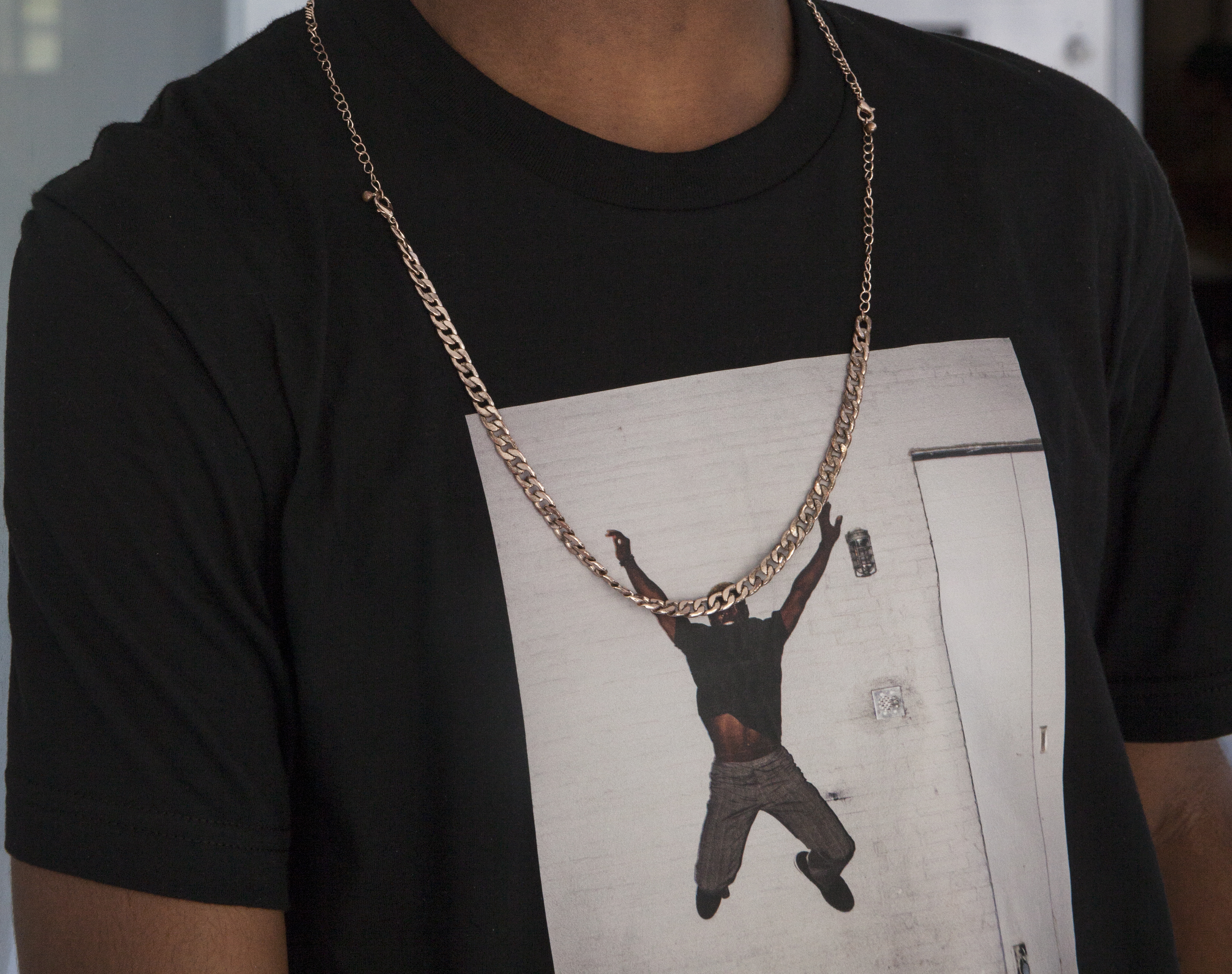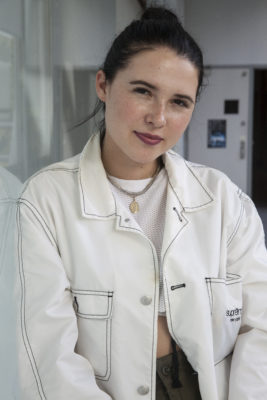
Her name is Coco Wohrle, and she is not voting in the upcoming presidential election. She does not want to spend time submitting her absentee voter information.
“Honestly, it’s a hectic mess,” said Wohrle, a burgeoning 19-year-old photographer studying communication design at Parsons. She is registered to vote in her native California. Anyone voting from outside their state of residence is able to participate in voting by simply printing, filling out, and sending basic identification forms to their hometown voting office. Doing so at least two weeks prior to Election Day on November 8th would allow potential absentee voters like Wohrle to receive and submit their absentee vote-by-mail ballots in time for their votes to be counted.
“I do know it’s important to vote, but I’m not stressing about it. I’ve never been interested in politics,” she said. Wohrle is the daughter of German immigrants, both of whom, she says, have never voted in U.S. elections nor have ever discussed politics with her. “I would vote if it were easier, if I could just walk into a spot, type in my name and my address and my social security number, and make my choice.”
Almost five decades have passed since the 26th Amendment lowered the legal voting age from 21 to 18, yet historical voting analysis shows that young adults in America generally vote at lower rates than their older counterparts.
According to Tufts University’s Center for Information and Research on Civic Learning and Engagement (CIRCLE) data, voting rates for people aged 18 to 24 dropped from 52.1 percent in 1972 to 41.2 percent in 2012. (Such a large percentage of young voters may have participated in that 1972 election because of their involvement in the Vietnam War, as an archival CNN article suggests.) Nowadays, Harvard Institute of Politics surveys show, young people mostly engage in political action online by advocating for their favored social justice issues through social media and petitions rather than actually voting.
Whether they recognize the power of their voice, millennials could have actual influence over the outcome of the election. Both Republican and Democrat parties are growing, Tufts’ CIRCLE Center showcases, due to the 16.5 million people who have turned 18 since Obama and Romney’s face-off in 2012. Young people now share the electoral power of their Baby Boomer parents and grandparents, but whether they will actually vote is unpredictable.
“Nearly every data point from our polling indicates that the relationship between our government and [m]illennials is fractured,” John Della Volpe, the director of polling at Harvard University’s Institute of Politics, reported. “To engage [m]illennials now and in the future, trust in the system and in those who seek to lead it must be re-built.”
Education, experience, and engagement are the three factors that have the greatest influence on the political actions of young people, said Professor David Plotke, who is teaching a New School for Social Research politics class about the 2016 presidential election.
“If there is some major political issue on the table that directly and immediately affects young people—a draft into the army—they will become active,” he said. Older people, he says, are more likely to vote than the younger generations that succeed them because they have been in school longer; are more comfortable voting routinely because they’ve done it before; and have established financial, familial, and other commitments that make them more interested in how political decisions will affect them.
Kirill Clark, a Lang sophomore who is the founder and president of The New School College Republicans group, offers a different opinion. He says that voters across the nation may not vote because they feel disaffected and dislike the candidates, which is reflected by both Clinton and Trump’s high unfavorability ratings.
The NSFP could not get a comment from a New School Democratic student group, because no such organization exists.
Of the 61 New School students surveyed online by the New School Free Press about their plans to vote this November, 69 percent are registered Democrats. Less than 10 percent voted in the 2012 presidential election, because they were not old enough. Thirteen percent of students surveyed are planning on not participating in this year’s election—largely due to either their citizenship status, their unwillingness to submit absentee ballots and disinterest in politics overall.
Experts are concerned that that non-voting students don’t fully understand the consequences of their lack of action.“I’m worried that if young people don’t follow through with voting in this election, candidates won’t continue to prioritize the issues that may seem important to the millennial generation, like healthcare or student debt, in the midterm elections and state elections,” said Mike Burns, the national director of Campus Vote Project, a nonpartisan outreach organization launched in 2012 by the Fair Elections Legal Network to help colleges reduce student voting barriers.
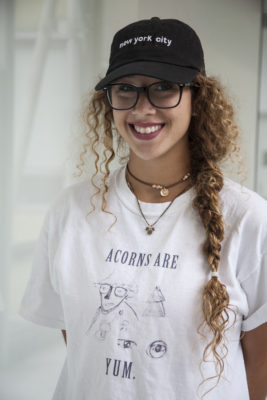
Lang student Samantha Kenny typically doesn’t have a great interest in social issues, and she says her family and friends share her indifference towards politics. Most of what she does know about the election and its candidates is told to her by her peers.
Kenny is choosing not to vote because she feels as if she is too busy to formulate her own unbiased opinion on the candidates.
“I don’t have the time to sit down and formulate [my own perspective on the election],” she said. Kenny commutes from Connecticut to Eugene Lang, where she is majoring in Literary Studies with a focus in creative writing, while balancing a job, music gigs and recording sessions, and helping her parents with their six kids. She says her lack of free time limits her from learning about politics.
“I know it’s bad to not vote,” she said. “[But] I think it’s really bad to vote without having your own personal opinion and complete understanding of what you believe, because that’s sort of like you’re voting for somebody else.”
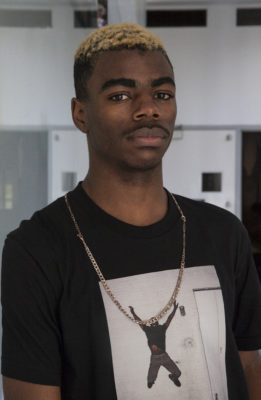
Tyrell Hampton, a photography major at Parsons, shares strikingly similar sentiments. He is planning not to vote because he feels underqualified to put someone into such a powerful position.
“I feel like I don’t have the right to vote,” Hampton said. “I haven’t been in the world enough yet to see what we need. Voting is for old people… I still see myself as a child.”
He reads The New York Times and regards social justice initiatives like the Black Lives Matter movement and fixing the incarceration system as important. Yet he doesn’t know how to define himself; he agrees with various statements presented by both Democrats and Republicans, and therefore feels as if he cannot pick a side.
Hampton’s mother, notably, is an active Democrat. She is an active social justice advocate and even attended the last Inaugural Ball; Hampton chose to stay home and watch the event on television instead. “[My mom] votes every year,” he said. “She’s one of those. One of those voters who wakes up and actually gets a[n ‘I Voted!’] sticker, just puts it on her car. It makes her happy, so it makes me happy.”
He says his mother is unaware but might be disappointed in his decision not to vote. Throughout his life she ingrained into him the mantra that when he votes, he is voting for the person he wants to change the world. Hampton says neither candidate fits such criteria.
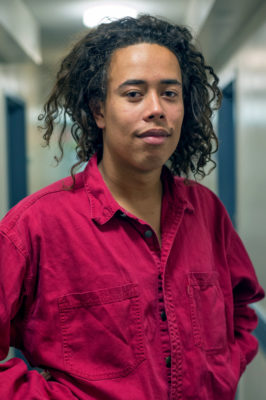
Both Hampton and Ousmane Sow, a sophomore at Lang choosing not to vote because he does not like either candidate, would have voted for Bernie if he were still in the race.
Sow identifies as a liberal Democrat and wants politicians to be entirely transparent. Undecided what he wants to study at the New School, Sow finds economic inequalities on both the national and global scale problematic, and is involved in the Black Lives Matter movement, attending protests frequently. His focus is on small community leadership and the communities themselves.
“I am not voting because I don’t support this corrupt system,” Sow said.
“If Hillary wins, I’m going to be like, ‘I expected this. This is what the powers that be wanted to happen,’” he said. “And if Trump wins, I’m going to be pissed, because it’s like, ‘Is this really what America is about right now in this day and age? Hating Muslims and immigrants?’”
Donald Trump, in his eyes, is “a bad, loud, stupid bully” who makes Americans “feel defensive when they aren’t being attacked.” Because of what he describes as a wishy-washy track record, he does not trust Hillary in any capacity. While he doesn’t like either candidate, Sow doesn’t hate them; he would simply hate for them to lead this country.
Come November, he will be watching silently as the President of the United States is elected for him. “At this point, I feel like it’s a waste of a vote,” Sow said.
EDITOR’S NOTE: As this package was launched, Tyrell Hampton notified the author that his voting intentions had changed. He is now planning on voting in this upcoming presidential election. “My mom is making me vote,” Hampton said. “She made a good point: ‘It’s my right as a citizen.’”







